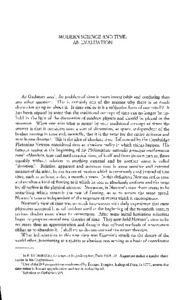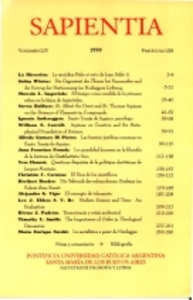Por favor, use este identificador para citar o enlazar este ítem:
https://repositorio.uca.edu.ar/handle/123456789/12683| Campo DC | Valor | Lengua/Idioma |
|---|---|---|
| dc.contributor.author | Elders, Leo J. | es |
| dc.date.accessioned | 2021-11-02T17:10:55Z | - |
| dc.date.available | 2021-11-02T17:10:55Z | - |
| dc.date.issued | 1999 | - |
| dc.identifier.citation | Elders, L.J. Modern science and time : an evaluation [en línea]. Sapientia. 1999, 54(205) Disponible en: https://repositorio.uca.edu.ar/handle/123456789/12683 | es |
| dc.identifier.issn | 0036-4703 | - |
| dc.identifier.uri | https://repositorio.uca.edu.ar/handle/123456789/12683 | - |
| dc.description.abstract | Resumen: As Gadamer saysi, the problem of time is more inextricable and confusing than any other question. This is certainly one of the reasons why there is so much discussion going on about it. Is time real or is it a subjective form of our mind? It has been argued by some that the traditional concept of time can no longer be upheld in the light of the discoveries of modern physics and should be placed in the museum. When one asks what is meant by «our traditional concept of time» the answer is that it considers time a sort of dimension, as space, independent of the bodíes moving in time and, secondly, that it is the same for the entice universe and runs in one direction. This is the idea of absolute time. Influenced by the Cambridge Platonists Newton considered time an absolute reality in which things happen. His famous saying at the beginning of his Philosophiae naturalis principia mathematica runs: «Absolute, true and mathematical time, of itself and from its own nature, flows equably without relation to anything external and by another name is called "duration". Relative, apparent and common time is some sensible and external measure of duration, by the means of motion which is commonly used instead of true time, such as an hour, a day, a month, a year». In this definition Newton reifies time and ascribes a kind of flowing to ít which he sees as absolutely uniform and the same for all entities in the physical universe. Moreover, in Newton's view there seems to be something which controls the cate of flowing, so as to secure the same speed. Newton's time is independent of the sequence of events which it encompasses. | es |
| dc.format | application/pdf | es |
| dc.language.iso | eng | es |
| dc.publisher | Pontificia Universidad Católica Argentina. Facultad de Filosofía y Letras | es |
| dc.rights | Acceso abierto | * |
| dc.rights.uri | http://creativecommons.org/licenses/by-nc-sa/4.0/ | * |
| dc.source | Sapientia. 1999, 54(205) | es |
| dc.subject | TIEMPO | es |
| dc.subject | CIENCIA | es |
| dc.subject | MODERNIDAD | es |
| dc.title | Modern science and time : an evaluation | es |
| dc.type | Artículo | es |
| uca.disciplina | FILOSOFIA | es |
| uca.issnrd | 1 | es |
| uca.affiliation | Fil: Elders, Leo J. Investigador independiente; Países Bajos | es |
| uca.version | publishedVersion | es |
| item.fulltext | With Fulltext | - |
| item.grantfulltext | open | - |
| item.languageiso639-1 | en | - |
| Aparece en las colecciones: | SAP - 1999 Vol LIV nro. 205 | |
Ficheros en este ítem:
| Fichero | Descripción | Tamaño | Formato | |
|---|---|---|---|---|
| modern-science-time.pdf | 140 kB | Adobe PDF |  Visualizar/Abrir | |
| sapientia205.jpg | 26,71 kB | JPEG |  Visualizar/Abrir |
Visualizaciones de página(s)
41
comprobado en 27-abr-2024
Descarga(s)
46
comprobado en 27-abr-2024
Google ScholarTM
Ver en Google Scholar
Este ítem está sujeto a una Licencia Creative Commons

